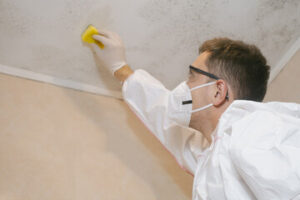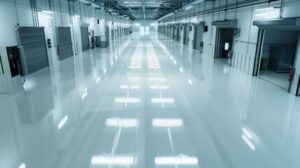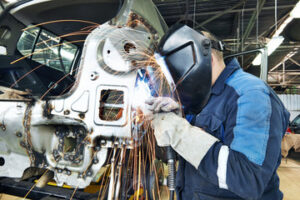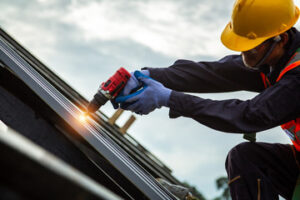Mold Removal Salt Lake City can be a difficult task. It is important to hire professionals to do the job.

They will inspect and survey the problem area, find the cause of the mold and develop a plan for remediation.
Porous materials that are infested with mold need to be removed and disposed of properly. This includes drywall, carpet and insulation.
During the inspection, a trained mold removal specialist will look for visible signs of mold and other potential sources of moisture in your home or business. This is when they can determine the proper course of action for remediation and prevention, such as fixing underlying issues that fuel mold growth, improving ventilation, and taking other preventive measures.
Ideally, you should schedule an inspection as soon as you notice any signs of water damage or mold in your home. This will give the inspector time to investigate and provide you with a full report on the inspection results. This will include information on the type of mold present, the level of contamination, and a description of any underlying causes that may be fueling the growth.
In addition to visual investigation, a mold inspector will take air and surface samples. The samples will be sent to a laboratory for analysis. The results will help the inspector to determine the type of mold present, and what types of spores are in the air. These results will also tell the inspector what conditions are necessary for future growth.
For this reason, it’s important to turn off your HVAC systems before scheduling your inspection. This will help stabilize indoor temperatures and prevent the introduction of any extra spores into the sampled area. You should also shut off any dehumidifiers and air purification machines, as these can affect the test results.
When the air and surface samples are returned to the inspector, he or she will interpret the results and create a protocol for a mold remediation contractor. The protocol sets the scope of work for the restoration company and will be used by both parties to understand what needs to be done in the affected area.
During the cleanup process, it’s important to wear rubber gloves, eye protection, and a face mask with a particle filter. Mold spores can be airborne, and they can spread from one room to another if disturbed during the process. It’s also important to contain the moldy areas, and use plastic or polyurethane sheeting to keep spores from spreading to unaffected areas of your home or business.
Cleaning and Disinfection
Mold removal involves scrubbing surfaces to remove visible growth and treating them with biocide or fungicide. Depending on the severity of the mold, this may also include tearing down and disposing of drywall, carpeting, or insulation. Professionals may also use a hEPA-approved vacuum to remove and capture spores, so they don’t become airborne and spread to other areas of the home or business.
Before starting, workers should wear personal protective equipment (PPE) such as gloves, safety glasses or goggles, and a mask to protect against inhalation of mold spores. It’s important to open windows and doors during cleaning to ensure the work area is properly ventilated.
Bleach is a powerful disinfectant and an effective mold killer on hard, non-porous surfaces. It can be used in combination with other household cleansers and is often recommended by remediation professionals. However, it can damage porous surfaces such as wood and drywall and isn’t always effective against deep stains. Bleach should be diluted with water, and it’s not appropriate for use on electronics or appliances.
Vinegar is another household staple that can be used to kill mold. This mild acidic cleaner can be used to clean many surfaces and is a popular alternative to bleach for surface disinfection. Like bleach, vinegar is highly effective against mold on hard, non-porous surfaces and can be used in conjunction with other household cleansers to create a powerful cleaning solution.
Oftentimes, mold is hiding inside walls, which can be difficult to get to and treat. Mold inside walls can cause a musty odor in the home and can contribute to allergy symptoms. If you suspect you have mold behind your walls, it’s important to call a professional who will be able to assess the situation and determine if the drywall needs to be removed. The pros can then spray the studs and sheathing with a biocide or fungicide to prevent further mold growth, and they’ll use fans and dehumidifiers to speed up the drying process. This is an important step, as moisture levels should be below 12 to 15 percent before rebuilding or painting can take place.
Removal of Moldy Items and Materials
Before cleaning, it’s important to understand why mold is growing. Fungi need moisture, food, and proper temperature for growth. Once the underlying cause is fixed, the mold can be removed. Otherwise, it will return. In addition to a thorough inspection, this includes eliminating the water or moisture intrusion and providing adequate ventilation. A full-service restoration company can help with this process.
Porous building materials such as carpeting, clothing, plaster and drywall that are infested with more than a small area of mold should be removed from the premises rather than cleaned. Mold spores are embedded deep within the materials, and even thorough cleaning often does not fully remove them. Depending on local regulations, these materials may be disposed of in a regular landfill.
It is important to isolate the work area and vent to outdoors during mold cleanup. Disturbing the mold colonies can release a large number of spores that can spread to other areas of the property. It is also important to wear a respirator during this process to avoid inhaling spores.
If the affected items are paper materials such as books, photographs, or documents, they can be decontaminated by freezing them for 24 hours before being cleaned. This deactivates the mold and allows for easier cleaning.
The use of a disinfectant is recommended on any surface that has been infested with visible mold or mildew. A commercial disinfectant, such as a diluted bleach solution, can be used to clean the affected surfaces. Vinegar is also a powerful antifungal and can be used in place of bleach. Alternatively, a mixture of equal parts vinegar and water can be used to kill mold and mildew.
Tea tree oil, derived from the Melaleuca Alternifolia plant, is another effective natural antifungal. It can be added to a spray bottle at the ratio of 1 teaspoon per cup of water and sprayed onto the moldy surface. A scrub brush can then be used to scrub the affected area and rinse the surface with clean water. Immediately after this, the item should be dry and ventilated to the outside.
Remediation
Mold spores are airborne and will quickly spread to other areas of the home, so the first step of remediation is to contain the affected area. Mold removal specialists use negative air machines and specialized microbial volatile organic compounds (MVOC) filters to control the release of airborne contaminants. They also hang plastic sheets to prevent contamination from spreading to other parts of the home.
Professionals spray the moldy area with a biocide solution to keep spores from reproducing. Then they vacuum and scrub all non-porous surfaces in the affected area, removing all visible signs of mold. Then they wipe down all wood and other surfaces with disposable rags soaked in a detergent solution, and rinse the cleaned surfaces with clean water. After the mold is gone, they encapsulate the area with an EPA-approved mold resistant coating encapsulant.
If the mold was caused by a leak, they will repair the leak and dry out the area to prevent new growth. They may also treat the area with a fungicide to prevent further growth.
The next step is to clean all contaminated surfaces with cleaning solutions that kill and remove mold spores, disinfect and deodorize. This includes wood surfaces, drywall, and insulation. They will also remove all damaged materials and dispose of them according to EPA standards. Depending on the extent of the mold damage, this could include removing drywall and carpeting.
Before re-occupying the area, professionals inspect it to ensure the moisture problem has been fixed. They look for any visible mold, stains, or odors. They also check the air for MVOCs and other contaminants to ensure a healthy, mold-free environment.
Mold is common, but it should never be ignored. Moldy building materials need to be removed and properly disposed of to prevent further spores from growing and other health issues. A trained mold remediation specialist will inspect your property and determine the best course of action for your unique situation. They will take into account the size of your property and the extent of the damage, as well as determining if any moldy items are salvageable.








